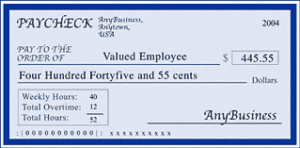What’s the Cheapest Payroll Outsourcing in 2024?
The cheapest payroll outsourcing cost between $4 – $6 per employee per month plus a small base rate. This includes tax filing, direct deposit, and more.
Payroll can be one of the most time-consuming and frustrating tasks for a small business owner to tackle, making it an ideal candidate for outsourcing to a third-party provider. Luckily, there are cheap payroll services available that can make this an extremely inexpensive proposition.

Usually, you will have to pay a basic account fee each month, which can cost as little as $25-$150 depending on the services included in your package. Then, you will pay an additional fee for every employee you need payroll processed for each pay period. This can be as affordable as $0.83 for a basic check, or as much as $9.30 for options including tax processing and direct deposit to your staff’s bank accounts.
The complexity of the payroll that needs to be handled accounts for most of the increases in the price of a payroll service. For instance:
- Direct deposit
- Overtime hour calculations
- Irregular or casual hours
- Tax filings
- Specialized requests
- Reimbursement payments combined with payroll
- Commission calculation

Could all cause your fees per payment to go up somewhat. On the other hand, if you have several employees contracted for regular hours on salary, and who prefer to get paid via a check handed to them in person, then you’re going to be able to find a real bargain when pricing out your payroll services.
The base-level fee that you pay often depends on the size of your organization and the value-added services the payroll firm offers. If you’re looking for the best, low-priced options available, look for a stripped-down service that just focuses on the basics.
Three Tips to Finding the Cheapest Payroll Service
Here are three tips to get the cheapest payroll outsourcing, along with explanations for each:
-
Compare Multiple Providers:
- Why: Comparing multiple payroll outsourcing providers helps you find the most competitive rates and services tailored to your business needs. Providers often have different pricing structures, so it’s crucial to evaluate their offerings against your payroll requirements. This can include the number of employees, frequency of payroll, additional services like tax filing, and support levels. By shopping around, you can better understand the market rates and negotiate better terms.
-
Opt for a Basic Service Package:
- Why: Many payroll providers offer tiered service levels, ranging from basic to premium. The basic packages typically cover essential payroll processing services at a lower cost. By choosing a basic package, you can avoid paying for advanced features or additional services that your business may not need. This approach allows you to focus on the core functionality required for payroll processing, such as calculating pay, taxes, and compliance with regulations, without incurring unnecessary expenses.
-
Negotiate a Customized Plan:
- Why: If the standard plans offered by payroll providers don’t fit your budget or needs, negotiating a customized plan can be more cost-effective. A tailored plan allows you to pay only for the services you require. This approach is particularly beneficial for small or medium-sized businesses that may not need the full spectrum of services offered in standard packages. Customized plans can be adjusted as your business grows, ensuring you only pay for what you need at each stage of your business’s development.
These strategies help you find a payroll outsourcing solution that fits your budget while ensuring that your payroll needs are met efficiently and in compliance with relevant laws and regulations.
What to Look for in Low-Cost Payroll Services?
 If you’re looking for the biggest discount when it comes to payroll services, then you’re going to want a company that doesn’t automatically complete all your tax filings on your employee payments. Now, obviously, this is something that still needs to be taken care of, but there are some scenarios where you could save money by opting out of this service with your payroll firm, such as if you handle it in-house, or if you are only issuing payments to independent contractors, which would require much different tax reporting. Whichever route you take, consider these items before hiring a payroll service:
If you’re looking for the biggest discount when it comes to payroll services, then you’re going to want a company that doesn’t automatically complete all your tax filings on your employee payments. Now, obviously, this is something that still needs to be taken care of, but there are some scenarios where you could save money by opting out of this service with your payroll firm, such as if you handle it in-house, or if you are only issuing payments to independent contractors, which would require much different tax reporting. Whichever route you take, consider these items before hiring a payroll service:
- Reporting: What reporting details do you require for payroll?
- Tax Filing and Withholding: Do you want your payroll service to make tax payments to the IRS and local/state requirements?
- Payroll Deductions: Will you be withholding loans, insurance fees, wage garnishments, etc?
- PTO Accrual: Will you offer paid time off, vacation, and sick time accrual?
- W-2 and 1099: Will you use the payroll service to produce year-end W-2s and 1099’s?
- Payment Options: Will you pay hourly or salary? Do you require direct deposit, or print checks onsite?
Ideally, you want to look for a company that doesn’t package elements of their service together in any compulsory way. You want to be able to pick and choose which elements of their service you want. That way, if you want to keep costs as low as possible by simply looking for a company to issue checks on your behalf, then you maintain that option.
Another feature that you should look for is the ability for employees to access any information they might need directly from the payroll company. Many companies maintain an online portal or software that employees can log in to in order to obtain any information that they need for their own taxation or records keeping purposes. This cuts out the middleman and allows them to get the information they need quickly and automatically.

Reporting features are also important to look into before you hire a payroll service. Good reporting is at the heart of keeping a business running smoothly, so having the ability to generate custom reports that summarize the payroll data that you need is very convenient. Much like the employee services, in the best-case scenario, this information should be accessible through some type of automated portal.
Bargain Payroll Service Companies with Discounted Prices
 Keeping in mind all the factors that have been highlighted above, the two options below provide a good blend of a useful mix of services along with affordable prices. Compared to most of the other options on the market, either one should be available at a bargain.
Keeping in mind all the factors that have been highlighted above, the two options below provide a good blend of a useful mix of services along with affordable prices. Compared to most of the other options on the market, either one should be available at a bargain.
Best Value Per Dollar Invested:
Our team reviewed 25 payroll service companies across the US and found two companies that really stood out offering the best service for your money. In this review, we looked at monthly base cost, reporting & features, and tax filing solutions. While we suggest getting at least 4 quotes to compare, here are two of the best payroll service companies you should consider in your search for a value-based solution:
 Intuit: Intuit is a great company to choose for inexpensive payroll services for a number of reasons. First, the service is offered by a giant in the financial software industry, meaning that you have the expertise of a very experienced team standing behind your product. Second, they have among the lowest fees you will find. With three basic tiers of service, you can choose the one that fits your budget and your needs the best.
Intuit: Intuit is a great company to choose for inexpensive payroll services for a number of reasons. First, the service is offered by a giant in the financial software industry, meaning that you have the expertise of a very experienced team standing behind your product. Second, they have among the lowest fees you will find. With three basic tiers of service, you can choose the one that fits your budget and your needs the best.
 Gusto: Gusto offers several things that should be appealing to the budget-conscious manager looking for a payroll service. First, you can try a one-month free trial of the service to see how well it integrates with your business. Second, the base fee is currently only $39 per month with a $6 per employee charge. The company is upfront about its pricing and allows you to try before you buy, making it a highly recommended option.
Gusto: Gusto offers several things that should be appealing to the budget-conscious manager looking for a payroll service. First, you can try a one-month free trial of the service to see how well it integrates with your business. Second, the base fee is currently only $39 per month with a $6 per employee charge. The company is upfront about its pricing and allows you to try before you buy, making it a highly recommended option.
Get Started with a Cheap Payroll Service
The main reason to get started with an economical payroll service is that it can save you money. These services are largely automated, using software to do in minutes what a paid employee might take hours to accomplish. With these tips, you can get your employees paid, your reporting obligations met, and save money all at the same time.
Understanding the Costs: A Breakdown of Payroll Outsourcing Fees
Outsourcing payroll is an increasingly popular decision among businesses, both big and small. By entrusting payroll responsibilities to third parties, companies can streamline operations, ensure compliance, and often reduce errors. However, one crucial factor that businesses need to consider before making the leap is the cost. This article offers a comprehensive breakdown of the various fees associated with payroll outsourcing.
1. Setup or Implementation Fee
When first contracting with a payroll provider, there’s often a one-time setup or implementation fee. This covers the cost of integrating your business’s specific requirements into their system, setting up your employee data, and any initial training sessions.
2. Per-Payroll Processing Fee
This is the most common recurring cost you’ll encounter. It’s usually structured as a fee each time payroll is run, which can be weekly, bi-weekly, or monthly. The cost may depend on the number of employees and the complexity of the payroll.
3. Monthly Base Fee
Some providers charge a monthly base fee in addition to, or instead of, a per-payroll fee. This can cover services like tax filing, report generation, and access to online portals.
4. Year-End Processing Fees
At the end of the fiscal year, there may be additional processes, such as the generation of W-2 and 1099 forms. Some providers will charge extra for these services, while others may include them in their base fees.
5. Additional Service Fees
Depending on your company’s needs, you might request additional services like garnishment payment processing, retirement contribution calculations, or benefits administration. Each of these services usually comes with its own separate fee.
6. Amendment Fees
Mistakes happen, and sometimes payroll details need corrections. If an amendment is required after the payroll has been processed, there could be a fee involved, especially if it relates to tax filings.
7. Online Access Fees
While most modern payroll providers include online portal access in their base offerings, some might still charge extra for features like mobile access, integration with other HR software, or advanced analytics and reporting.
8. Customer Support Fees
Most companies offer basic customer support as part of their package. However, if you need dedicated support, after-hours assistance, or specialized consultation, there might be additional costs.
9. Termination Fees
If you decide to end your contract before its expiration date, some providers may charge an early termination fee. It’s essential to read the fine print and understand the terms before signing.
The Bottom Line
The decision to outsource payroll should not be taken lightly, and understanding the costs involved is crucial. It’s essential to ask potential providers for a complete list of fees and ensure there are no hidden costs that might surprise you later on.
While outsourcing can often result in overall cost savings compared to in-house processing, especially when considering the intangible costs like time and potential errors, it’s essential to do a comprehensive cost-benefit analysis. Make sure to account for both the tangible and intangible benefits, and choose a provider that offers the best value for your business’s unique needs.
10 Questions to Ask Before Choosing a Payroll Outsourcing Provider (And Why)
Choosing a payroll outsourcing provider is a significant decision for any business. The right provider can save time, reduce errors, and ensure compliance, while the wrong choice might result in unnecessary headaches and costs. Here are ten vital questions to ask before making that decision, along with explanations of why each question is crucial.
1. What Services Do You Offer?
Why Ask: Different providers offer various services, from basic payroll processing to comprehensive solutions that include benefits administration, HR consulting, and tax filing. Understanding the range of services helps determine if they align with your business needs.
2. How Do You Ensure Data Security and Privacy?
Why Ask: Payroll data is sensitive, encompassing personal and financial information. A reliable provider should prioritize state-of-the-art security measures and comply with data protection regulations.
3. What is Your Experience with Companies in My Industry?
Why Ask: Industries can have specific payroll nuances. By selecting a provider experienced with your sector, you can be more assured they understand your unique needs and challenges.
4. What is the Cost Structure? Are There Hidden Fees?
Why Ask: Clear understanding of costs prevents unexpected charges. A transparent provider will break down fees, ensuring you know what you’re paying for.
5. How is Customer Support Handled?
Why Ask: Issues or questions can arise at any time. A provider with robust, accessible customer support ensures that you can get timely assistance when needed.
6. What Technology Do You Use, and How User-Friendly is It?
Why Ask: Modern, user-friendly software can streamline processes and improve efficiency. Knowing what platforms are used, and how intuitive they are, can affect daily operations.
7. How Do You Handle Tax Compliance and Year-End Reporting?
Why Ask: Tax compliance is complex and ever-evolving. A good provider will handle tax filings, ensuring you remain compliant and avoid penalties.
8. Can Your Service Scale with My Business Growth?
Why Ask: As your business grows, your payroll needs will evolve. An adaptable provider can accommodate growth, preventing the need for a provider switch later.
9. How Do You Stay Updated on Changing Payroll Laws and Regulations?
Why Ask: Payroll laws change frequently. A proactive provider will stay abreast of these changes, ensuring you’re always in compliance without needing to track these changes yourself.
10. What is the Process for Resolving Errors or Discrepancies?
Why Ask: Mistakes can happen, regardless of how reliable a system might be. Knowing how a provider handles errors ensures that corrections are swift, reducing potential fallout.
Choosing a payroll outsourcing provider is more than just selecting a company to handle paychecks. It’s about forging a partnership that will impact your business operations, compliance, and employee satisfaction. By asking these questions, you can find a provider that aligns with your business values, needs, and growth trajectory.
You may also be interested in:
Economical HR Outsourcing
